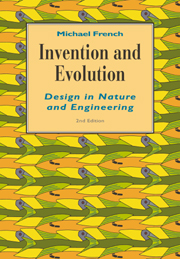Book contents
- Frontmatter
- Contents
- Preface to the second edition
- Preface to the first edition
- Acknowledgements
- 1 The designed world
- 2 Energy
- 3 Materials
- 4 Mechanism
- 5 Structures
- 6 Systems
- 7 The practice, principles and philosophy of design
- 8 Economy, form and beauty
- 9 Production, reproduction, evolution and design
- 10 Designing and inventing
- 11 Some case studies
- Questions
- Answers
- Suggestions for further reading
- Index
3 - Materials
Published online by Cambridge University Press: 06 January 2010
- Frontmatter
- Contents
- Preface to the second edition
- Preface to the first edition
- Acknowledgements
- 1 The designed world
- 2 Energy
- 3 Materials
- 4 Mechanism
- 5 Structures
- 6 Systems
- 7 The practice, principles and philosophy of design
- 8 Economy, form and beauty
- 9 Production, reproduction, evolution and design
- 10 Designing and inventing
- 11 Some case studies
- Questions
- Answers
- Suggestions for further reading
- Index
Summary
Materials, design and craftsmanship
The appreciation of materials, their special properties, their fitness for certain purposes, the deep satisfaction given by their cunning and sympathetic use in articles combining function and ornament, is an important part of human culture. Scythes and violins, walnut and mahogany furniture, tweed cloth and silver cutlery, glass and bronze, all show the subtle alliance of craftsmanship and the nature of the raw material in the creation of artefacts combining beauty and use. All this was achieved with very little in the way of science, before we enjoyed anything of the understanding of materials we have now, and it is one of the fundamental failures of imagination of our age that it does not recognise that this tradition has not perished, but has flourished and transcended itself in some modern engineering products. For example, a record-player pick-up cartridge may marry a tiny preciselyshaped diamond, a fine strip of bronze three times as tough as anything known 100 years ago, delicate coils of wire as fine as a spider's web, a powerful little magnet made of rare metals or oxides, whose existence was unsuspected a century ago, and intricate and perfectly-fitting parts of strong plastics and metals.
Moreover, all this was offered, not to kings or bankers, but to any citizen of the developed world. For perhaps half a day's pay he could buy this triumph of craftsmanship and ingenuity, beyond anything made by Faberge.
- Type
- Chapter
- Information
- Invention and EvolutionDesign in Nature and Engineering, pp. 54 - 78Publisher: Cambridge University PressPrint publication year: 1994



